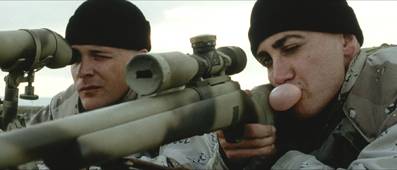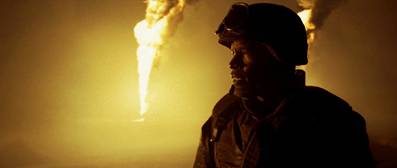"I'd love for you to quote me on this, because we definitely
should not be there. But that is not what this movie is about." |
Sam Mendes, director, answering the inevitable
'where do you stand on Iraq?' question quoted
in Hotdog magazine, January '06 |
He's
absolutely right on all counts. But Jarhead is deliberately 'here it is' not 'here it is and this
is how I feel about it and how you should feel about it'.
Mendes just tells Anthony Swoffham's celebrated 'Desert
Storm' memoir loosely but assuredly and has made a film
unique for the fact that very little actually happens
and yet, it's still engrossing.
This
movie is about the late 90s' Gulf War as much as Gone
With The Wind is a movie that examines the political
intricacies of the American civil war. Jarhead is about the eroding effects of time on highly trained,
inexperienced psyches with wide ranging intelligences
(brow-wise mostly from the middle down to low). In their
world, it's the march of the interminable minutes not
enemy action that brutalizes them, chews them up and disgorges
them out the other side, changed and forever skewed. Anthony
Swofford went out to the Middle East, a 20 year old, third
generation US soldier, ("I got lost on the way to
college…") with curiosity and wit. He managed
to jettison the idiosyncratic aspects of his character
(and that's a good thing?) and become a marine sniper
with the ambition to experience 'the red mist', the spray
of fine particles of blood that blow out from a fatal
bullet wound shot from hundreds of yards away. As you
do.

This pretty twisted ambition comes from a young man who
reads Camus (that's Albert Camus, the real McCoy) on the
loo. Let's be clear. Camus was an extraordinary writer,
a French existentialist who died way too young in a car
crash in the year of my birth. His most famous work (the
slim novel L'Etranger or as it's sometimes translated
The Outsider - which is why I adopted the name for this
site) is the existential work against which all others
are judged. It's a safe bet that very few jarheads would
(a) know what existentialism was and (b) if they found
the novel in the loo, they'd be glad of the extra toilet
paper. The irony here is that the life of a combat soldier
(or even Swoff's team of snipers), ruled by a distinct
hierarchy, is so far from the existential conceit that
you could get. Essentially, existentialism is living as
if we are in charge of our own destinies - how Albert
would hate me for that savagely simply breakdown of an
elegant and complex philosophy).
OK.
So Swoff reads Camus on the loo. So if this is the case
(he reads something we assume he understands), why is
he such a testosterone filled moron at a screening of Apocalypse Now? Once again a modern film
references a classic (to the extent of showing great swathes
of the referenced work) and falling prey to what was being
shown outshining the movie framing the clip. In Jarhead's
case it's the extraordinary helicopter attack. Mendes
couldn't have chosen a more powerful clip reminding us
just how great that film is. And again with the irony.
Coppola's breathtaking scene - suffused with enough of
the stuff to start a foundry ("Fucking savages,"
says Col. Kilgore as his helicopters strafe the villagers,
oh how we laughed) - is used as a backdrop for national
pride. It's Vietnam for Christ's sake! The cinema full
of marines cheers each missile strike, each 'gook' brought
down by the might of Uncle Sam, each Wagnerian blast from
the choppers. It's almost like you want to claw your way
to the front of their screening and proclaim "You're
all idiots! This is irony. It's meant to show how badly
the American forces behaved in Vietnam!" I may have
clawed my way to the front but I'd be lucky to drag myself
out of the exit once the jingo jarheads had had their
way with me. Even Swoff (Camus-aware Swoff) is whooping
and hollering. I suspect this a nod to Kubrick's advertising
campaign for Full Metal Jacket - a helmet
of war with a peace badge on it. Swoff goes from intellectual
to blood crazed ape in a matter of screen minutes. I think
this is Mendes way of saying 'If you think a man can change
in minutes think what he can turn into over the best part
of a year…with nothing to do.'
A
jarhead is a marine, so called for the ferociously short,
back and sides that gives the adorned cranium a good stab
at winning best storage jar impression at the next local
fete. A jarhead could also be a generic term for an alarming
cross section of men with wildly varying morals, stamina,
intelligence and bravery. These men are wound up to the
last gnat's hair of snapping and then shipped out to foreign
climes to crack in the relative safety of another country.
We all know what happens to wound up servicemen left to
their own devices back home. If recent news stories are
to be believed, they kill their wives, their kids and
then themselves. At least they did in the US. That's a
level of stress no one should ever have to deal with.
So Swoff's story had enough resonance to appeal to Sam
Mendes, the theatrical director and Spielberg protégé,
whose first movie scooped Oscars (American Beauty)
and whose second (The Road To Perdition)
dared to go where no Hollywood movie had gone before -
down a very dark alleyway but then catastrophically nuzzled
up to the audience cooing as it approached in the third
act. Reviews tell us Spielberg may have gone the same
way with Munich but I will wait to see
how Spielberg the concerned, artistic, Jewish historian,
tackles one of the biggest, endlessly picked political
scabs in human history. With Sharon (That's Israeli PM
Ariel Sharon) still in hospital after his induced coma,
Spielberg seems to have timed his new film uncannily well,
that and getting it under the wire for potential Oscar
and Bafta glory.

What
is it about the drill sergeant scene that is so beloved
by film-makers? I don't know (but I've been told). Some
of these scenes seem mighty old. The symmetry of frame
is maintained and one guy (Swoff, naturally) gets picked
on. Unlike Kubrick's private Joker, Swoff makes the smartass
comment and does not get promoted for it. We get the same
ritualized, fetishistic, fascistic gun-loving scene ("There
are many like it but this one is mine…") and
it sort of seems on Marine-ville auto-pilot. There's nothing
here we've not seen before (except of course it's Brokeback
Mountain boy du jour Jake Gyllenhaal, very convincing
as the principal jarhead, and his sidekick Peter Sarsgaard,
again a solid performance but not quite as stand out as
his work in Kinsey but then that's what happens when you play different characters
in different movies. How dare he?)
So,
they're off to kick Saddam out of Kuwait with Staff Sergeant
Sykes (played with some depth by Jamie Foxx) and what
do they find when they get there? Sand. Hundreds of miles
of desert, hot as hell and as exciting as a punctured
football. But no war. The war is happening somewhere else
- and mostly conducted by the air force - and what happens
to trained fighting men left alone to ponder the meaning
of life itching to deal out some of its opposite? Well,
they masturbate a lot and officially are advised to. They
sleep, compete and they go nuts with boredom, sometimes
really nuts. I had the fortune of working on a documentary
about the US Marines and got to digitally leaf through
hundreds of personal photos given to the crew by the guys
out in Iraq. Yes, several were posed and official looking
but hundreds were not which is why Abu Ghraib didn't surprise
me in the slightest. Here were men (and women in this
case), strong, in the prime of their physical lives, all
behaving like members of the very worst frat house on
campus. But it had a real decadent feel to it, like their
parents weren't there to keep them in line. It felt out
of control and that sits very badly on any Marine. In
fact it felt like Rome and given we have a new Empire
with a president that sort of fits.
Back
to Jarhead. There are stand out images
in Mendes' meditation ('war is really boring if you are
not fighting') and all the more powerful by occurring
in a movie about boredom (that's brave, whichever way
you slice it, making a film with the first Gulf War as
a backdrop with no combat). The nearest our 'heroes' get
is almost taking a pot shot at an Iraqi officer. Sarsgaard
loses it in this scene desperately wanting 'a kill' to
give his screwed up life outside the military some meaning.
The images that will stay with me are the oil fields ablaze
(this is where CG really comes into its own, ILM take
a bow for making Mexico equal the Middle East) and the
appearance of an oil soaked horse, perhaps an image that
is the most emotive of the film to horse lovers and those
indifferent to the beasts alike. It was ineffably sad.
In
all, Jarhead is a compelling study of
men almost at war. What stays with you are those extraordinary
images out there on the horizon, the burning oil fields
and you can almost taste the fetid heat, so vividly it
has been brought to the screen. I'm not sure the movie
will find much favour with Uncle Oscar but who minds when
a pair of gay cowboys and a Taiwanese director are about
to ride off into the sunset, panniers stuffed with statuettes
a-plenty? Coming soon to this site, a review of Brokeback
Mountain…
|